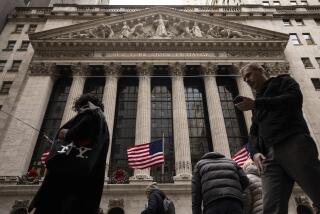Economists Foresee Slower Growth but No Recession in ’89
- Share via
WASHINGTON — Economic growth will slow significantly this year while inflation and interest rates both rise, but the country should be able to avoid a recession, the nation’s top business economists predicted today.
The National Assn. of Business Economists said a survey of its members found them slightly more optimistic about the economy’s fortunes in 1989 than they were just three months ago.
However, three out of four of the economists still believe President Bush will have to deal with an economic downturn in the first two years of his presidency.
That represented a decline from the 89% who last November expected a recession by the end of 1990, and the number predicting a recession this year showed an even bigger drop--from 40% three months ago to 19% now.
But the belief that the current expansion, which has already lasted a peacetime record of six years, will keep steaming ahead for two more years is still a minority view held by just one-fourth of the economists surveyed.
The median forecast for growth this year, as measured by the gross national product, was 2.7%, up slightly from a 2.5% estimate made three months ago.
That is still half a percentage point lower than the Bush Administration’s estimate that the GNP will expand at the robust clip of 3.2% in 1989.
The Administration is counting on faster growth to bring in more revenues and help it lower the budget deficit without the need to resort to higher taxes.
On the question of interest rates, another critical component of the budget deficit because of the cost of financing the $2.7-trillion national debt, the business economists see short-term rates hitting a peak of 8.5% this year and then beginning to decline to 7.8% by the end of 1989.
The Administration is forecasting substantially lower rates for this year.
The survey was taken before the Federal Reserve boosted the discount rate Friday to a three-year high of 7%. An increase in the discount rate, the interest the central bank charges to make loans to commercial banks, is the most dramatic gesture the Fed can make to show its determination to push the cost of credit higher and dampen inflationary pressures.
The business economists expressed strong support for the Fed’s inflation-fighting battle, with 70% expecting the board to boost interest rates further in the next six months.
More to Read
Get the L.A. Times Politics newsletter
Deeply reported insights into legislation, politics and policy from Sacramento, Washington and beyond. In your inbox twice per week.
You may occasionally receive promotional content from the Los Angeles Times.










